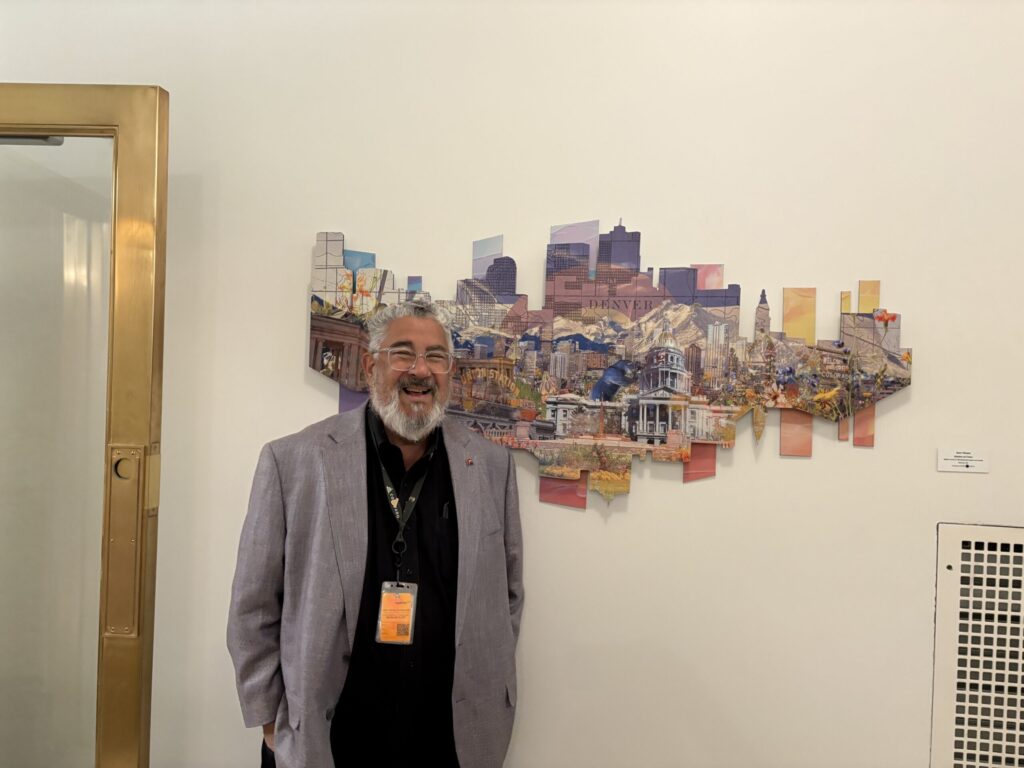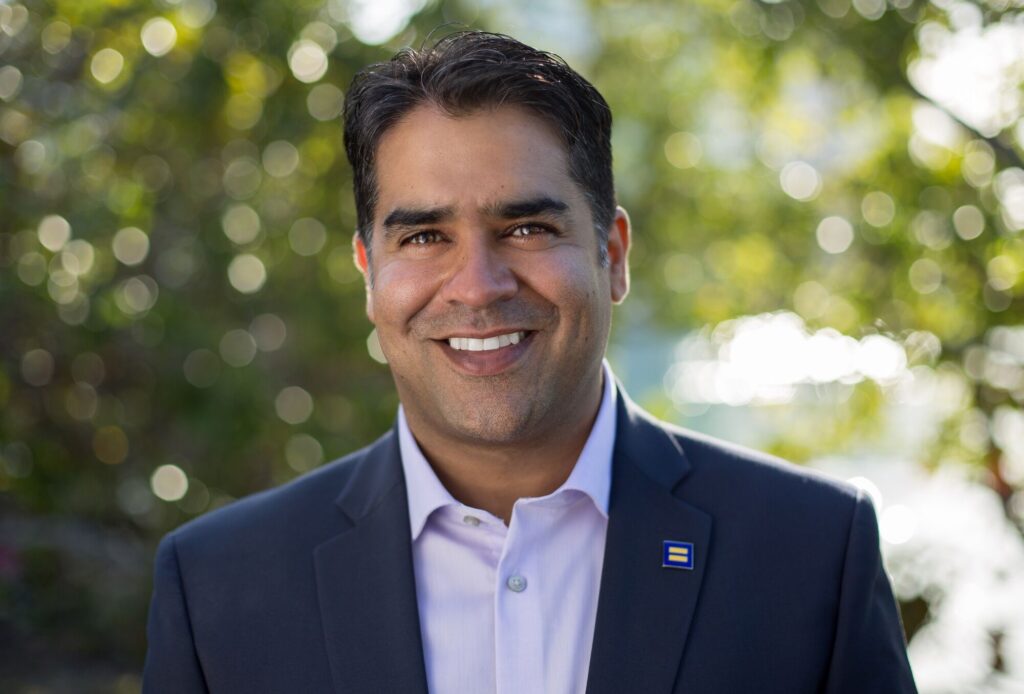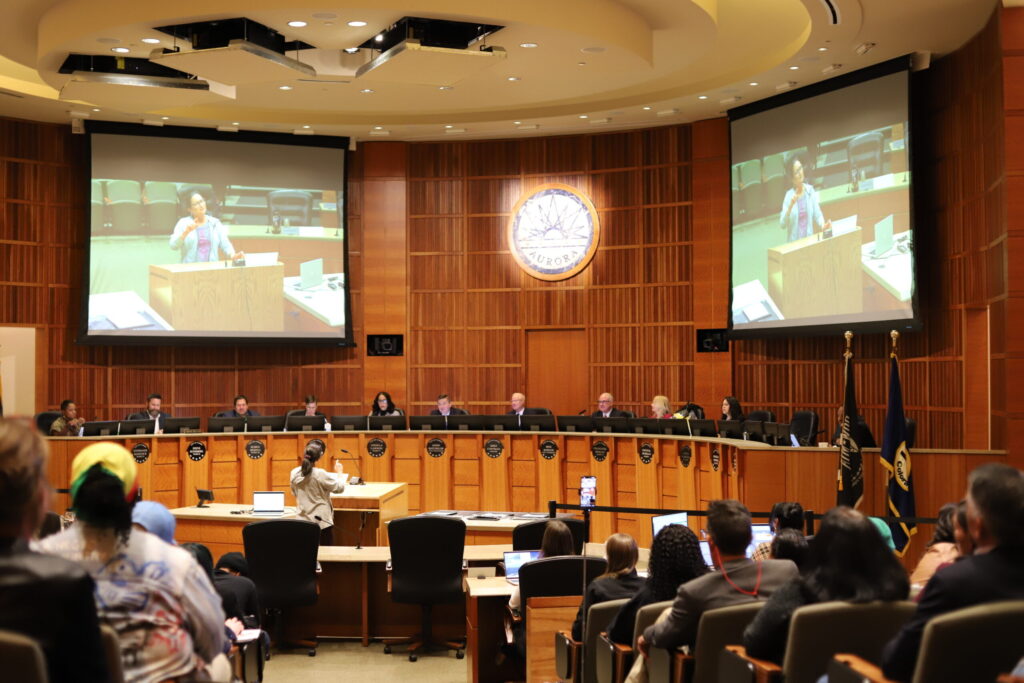Day II: A policy debate carousel — drugs, energy, terrorism and health care
The Colorado Statesman will be covering the 67th Conference on World Affairs at the University of Colorado Boulder all week with web-exclusive updated overviews of the action. For live coverage throughout the day, follow our reporter Lars Gesing on Twitter @LarsGesing.
***
If you assemble an “Our Tangled Drug Policy” panel in the state of Colorado, it shouldn’t come as a surprise to you that people — both on the stage and in the audience — will mostly talk about marijuana. Tuesday morning, neither the three panelists nor the audience were surprised in that regard.
Yes, they also talked about the pharmaceutical industry and how rules and regulations regarding antibiotics make our life better and worse today.
But the elephant in the room was marijuana legalization. Fox News commentator Mary Katharine Ham said if conservatives consider themselves Republicans and federalists, they should give states the authority to try and regulate marijuana. “Yes, things will go wrong,” she admitted but said that this trial-and-error evolution was basically the definition of democracy.
Ham, who spars weekly with Fox luminary Bill O’Reilly on his show, said anyone who sees marijuana legislation as a precursor to legalizing other Schedule I drugs was painting with an overly broad brush. “It took 45 years to convince the American people on this.”
Ham got support from Arthur Grim, the chairman of Pennsylvania’s Juvenile Court Judges’ Commission. The judge argued that current marijuana laws stigmatize and marginalize millions of Americans and waste considerable amounts of tax money. Grim used the example of an 18-year-old who grew small amounts of marijuana in his apartment for recreational use — a felony under Pennsylvania law. Grim said that stain will forever be etched into the young man’s record.
“If we criminalize behavior that ought not be criminalized, don’t you believe for a second that we will be able to expunge a record once the time comes.”
Terrence McNally, a radio commentator and Harvard graduate with a degree in social relations, also pleaded to change the view on how to deal with substances such as marijuana. He said, “I suggest we shift the paradigm and base it on science rather than morality.”
***
In February, Congress sent the controversial Keystone XL pipeline legislation down Pennsylvania Avenue and onto the president’s desk. Obama has vowed to use his veto, and the heated back-and-forth between environmental groups and oil companies consequently hasn’t faded out. “The Politics of Keystone” panel Tuesday afternoon tried to untangle the rhetoric with left-leaning communication strategist Marrow Cater, renowned geoscientist Richard Alley and Michael Franc, the former policy director for House Majority Leader Kevin McCarthy, R-Calif.
While they each came from their own ideological corner, the trio spent the better part of the 80-minute discussion agreeing that the Keystone XL pipeline, which would transport oil from the Alberta to the Gulf Coast, isn’t really the issue at hand.
“It’s a test to see what the abilities of the environmental movement are,” Franc said.
Alley agreed that in many ways, Keystone is a sideshow to a much broader debate, since oil is already finding its way from Canada to the Texas refineries.
“You should think of global warming like saving for retirement,” the scientist urged. “Any delay hurts. Keystone wouldn’t push us over the edge. The real issue is how do you get back to the discussion that using our knowledge makes us better off?”
The latter point was on Carter’s mind as well when she admitted Democrats can be their own worst enemies. “We think if we just shout loud and long enough, Republicans will eventually hear us.” That polarization of the climate change issue has effectively rendered it a non-starter, Carter said. Instead, “we deal with economic policies first.” But she jibbed, “We have to agree on the problem,” pointing to the group of GOP legislators who questions the human impact on climate change in the first place.
For Franc, talking about climate change is mostly a question of framing the issue. “Talk about a carbon tax that might be really attractive to people who care about economic policy,” he advised. His idea: Take the carbon tax revenue and reinvest it in tax breaks for middle-class families. “Make it as attractive as possible,” Franc said. “Get rid of all the favoritism. Create a level playing field. If a carbon tax is priced properly, it is ‘May the best fuel win.’ Then you are not talking about climate change, but you are talking to the Republican gene that hates cronyism.”
***
The best indicator of how much the rise of ISIS, Boko Haram and other terror organizations has garnered worried attention from many Americans was the room in which the afternoon panel “U.S. Foreign Policy Toward Boko Haram, ISIS and…” was scheduled to take place. Not a single seat was left untaken, security guards had to close the doors in front of many who were still trying to shuffle in last minute.
Jim Smith, the former U.S. ambassador to Saudi Arabia, opened his remarks with a clarification of terminology. ISIS, he reminded the audience, is in many ways different than insurgent groups such as Al Qaida or Al Shabaab, who operate in cells. ISIS, on the other hand, “essentially declared itself a government and conducts criminal activity to fund that government,” Smith explained.
Also on the panel was Joanne Grady Huskey, an international educator whose husband and two children were victims of the 1998 bombing of the U.S. embassy in Nairobi, Kenya. Grady Huskey saluted President Obama for reaching out to Iran rather than engaging in muscular rhetoric.
“It doesn’t work to bomb people,” she said. “I didn’t climb out of that [embassy] building and say, ‘I really like these people.’”
Instead, Grady Huskey argued, coalitions need to be the way to address the issue. “Let the Muslim world speak out on the atrocities, let them fight alongside us.”
Longtime Republican Congressman Mickey Edwards also supported some form of coalition building, albeit for different reasons. Too often the United States is getting involved in conflicts in places such as Egypt or Libya without carefully vetting who it is in support, Edwards said. He is convinced that the fight against ISIS should primarily be a fight for regional powers, such as Saudi Arabia.
“This is not a fundamental threat to the security and well-being of the United States” Edwards said, adding the U.S. shouldn’t send troops and resources until local powers fully commit. “It’s time for us to step back a little.” The congressman’s comments struck a nerve. The audience bathed him in rousing applause.
Joe Cirincione, president of the global security foundation Ploughshares Fund, disagreed that ISIS doesn’t pose a threat for the United States, although he too urged not to fall for the manifold inflammatory commentators.
“[ISIS] is not the Mongrol horde, we won’t see them knock on the doors of Vienna anytime soon,” Cirincione said. He added that while ISIS fighters are tough and dangerous, the group is also limited in scope and therefore can be defeated. The security expert charted a way toward that goal, one that the United States has followed before to turn the tide in a war.
ISIS, Cirincione argued, has made alliances with Sunni warlords in the cities and towns they overran. These warlords were alienated by a non-inclusive Iraqi government, led by Nouri al-Maliki, a Shiite.
“You have got to drain the ocean, you have got to withdraw the Sunni support [for ISIS],” Cirincione urged. “You have got to get Sunni tribal leaders to shift again.” He reminded the audience that strategy had ultimately made the difference when the U.S. overthrew Saddam Hussein’s regime.
***
If interest for the foreign policy panel was high, it went through the roof for yet another Tuesday afternoon session: “Health Care Reform Revisited.” Those lucky enough to find a seat — the line wound for several hundred feet — witnessed a panel that, amid many a partisan jab, came up with two major conclusions regarding the immediate future of the Affordable Care Act.
Michael Franc, the former McCarthy policy director, said the pending Supreme Court decision in King v. Burwell may very well be an “action-forcing event,” if a ruling in favor of the plaintiffs would indeed prohibit subsidies to those 34 states who opted not to set up federal exchanges. Estimates indicate that such a blow to the Affordable Care Act could strip up to 13 million Americans of their insurance policies. Franc said that ruling would prompt a push within the Republican caucus to come up with a viable alternative, rather than to continuously engage in what he called “the academic exercise” of voting to repeal Obamacare without even the most remote chance of ultimate success.
Joel Gallant is the associate medical director of specialty services at Southwest CARE Center in Santa Fe, N.M. He said if the Supreme Court justices in fact ruled in favor of the Obamacare critics, the ripple effects could destabilize the whole insurance market.
“Returning to state control allows for cherry-picking again,” Gallant said. “It only works as a federal system. We pool people who are high-cost and low-cost, high-risk and low-risk, and we balance it out.”
Stuart Butler pointed to a potential middle ground. The senior fellow in economic studies at the Brookings Institution said there should be some possibility for states to experiment with alternative methods of providing health care, as long as these methods fit into the Affordable Care Act’s overall framework.
Butler readily admitted that working out the details would not be easy and most likely tumultuous. But the British native resorted to a dry sense of humor to express his faith that at the end of the road, such an approach might just bring peace to the Obamacare wars.
Said Butler, “You can always trust the Americans to do the right thing after they have tried everything else first.”
***
Get social! The conference and its panels are designed to provoke thought. We want to carry that spirit forward. Join the online discussion and follow the Twitter hashtag #CWA2015. You can also watch the full sessions live or on demand here (https://www.colorado.edu/cwa/webcast.html)












